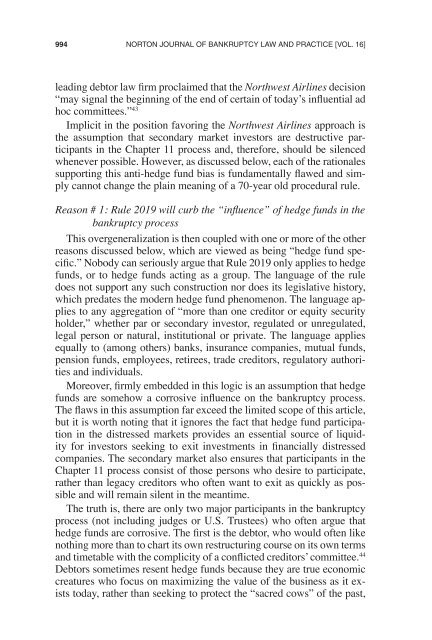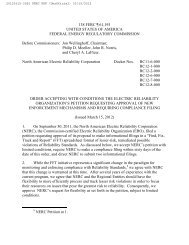Ad Hoc Committees and the Misuse of Bankruptcy Rule 2019
Ad Hoc Committees and the Misuse of Bankruptcy Rule 2019
Ad Hoc Committees and the Misuse of Bankruptcy Rule 2019
Create successful ePaper yourself
Turn your PDF publications into a flip-book with our unique Google optimized e-Paper software.
994 Norton Journal <strong>of</strong> <strong>Bankruptcy</strong> Law <strong>and</strong> Practice [Vol. 16]<br />
leading debtor law firm proclaimed that <strong>the</strong> Northwest Airlines decision<br />
“may signal <strong>the</strong> beginning <strong>of</strong> <strong>the</strong> end <strong>of</strong> certain <strong>of</strong> today’s influential ad<br />
hoc committees.” 43<br />
Implicit in <strong>the</strong> position favoring <strong>the</strong> Northwest Airlines approach is<br />
<strong>the</strong> assumption that secondary market investors are destructive participants<br />
in <strong>the</strong> Chapter 11 process <strong>and</strong>, <strong>the</strong>refore, should be silenced<br />
whenever possible. However, as discussed below, each <strong>of</strong> <strong>the</strong> rationales<br />
supporting this anti-hedge fund bias is fundamentally flawed <strong>and</strong> simply<br />
cannot change <strong>the</strong> plain meaning <strong>of</strong> a 70-year old procedural rule.<br />
Reason # 1: <strong>Rule</strong> <strong>2019</strong> will curb <strong>the</strong> “influence” <strong>of</strong> hedge funds in <strong>the</strong><br />
bankruptcy process<br />
This overgeneralization is <strong>the</strong>n coupled with one or more <strong>of</strong> <strong>the</strong> o<strong>the</strong>r<br />
reasons discussed below, which are viewed as being “hedge fund specific.”<br />
Nobody can seriously argue that <strong>Rule</strong> <strong>2019</strong> only applies to hedge<br />
funds, or to hedge funds acting as a group. The language <strong>of</strong> <strong>the</strong> rule<br />
does not support any such construction nor does its legislative history,<br />
which predates <strong>the</strong> modern hedge fund phenomenon. The language applies<br />
to any aggregation <strong>of</strong> “more than one creditor or equity security<br />
holder,” whe<strong>the</strong>r par or secondary investor, regulated or unregulated,<br />
legal person or natural, institutional or private. The language applies<br />
equally to (among o<strong>the</strong>rs) banks, insurance companies, mutual funds,<br />
pension funds, employees, retirees, trade creditors, regulatory authorities<br />
<strong>and</strong> individuals.<br />
Moreover, firmly embedded in this logic is an assumption that hedge<br />
funds are somehow a corrosive influence on <strong>the</strong> bankruptcy process.<br />
The flaws in this assumption far exceed <strong>the</strong> limited scope <strong>of</strong> this article,<br />
but it is worth noting that it ignores <strong>the</strong> fact that hedge fund participation<br />
in <strong>the</strong> distressed markets provides an essential source <strong>of</strong> liquidity<br />
for investors seeking to exit investments in financially distressed<br />
companies. The secondary market also ensures that participants in <strong>the</strong><br />
Chapter 11 process consist <strong>of</strong> those persons who desire to participate,<br />
ra<strong>the</strong>r than legacy creditors who <strong>of</strong>ten want to exit as quickly as possible<br />
<strong>and</strong> will remain silent in <strong>the</strong> meantime.<br />
The truth is, <strong>the</strong>re are only two major participants in <strong>the</strong> bankruptcy<br />
process (not including judges or U.S. Trustees) who <strong>of</strong>ten argue that<br />
hedge funds are corrosive. The first is <strong>the</strong> debtor, who would <strong>of</strong>ten like<br />
nothing more than to chart its own restructuring course on its own terms<br />
<strong>and</strong> timetable with <strong>the</strong> complicity <strong>of</strong> a conflicted creditors’ committee. 44<br />
Debtors sometimes resent hedge funds because <strong>the</strong>y are true economic<br />
creatures who focus on maximizing <strong>the</strong> value <strong>of</strong> <strong>the</strong> business as it exists<br />
today, ra<strong>the</strong>r than seeking to protect <strong>the</strong> “sacred cows” <strong>of</strong> <strong>the</strong> past,



